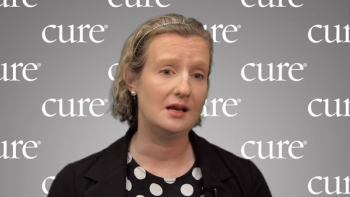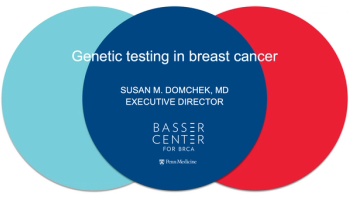
The Food and Drug Administration granted OM-301 an Orphan Drug Designation for the treatment of patients with myeloma.

Brielle Benyon, Assistant Managing Editor for CURE®, has been with MJH Life Sciences since 2016. She has served as an editor on both CURE and its sister publication, Oncology Nursing News. Brielle is a graduate from The College of New Jersey. Outside of work, she enjoys spending time with family and friends, CrossFit and wishing she had the grace and confidence of her toddler-aged daughter.
Follow Brielle on Twitter @Brielle_Benyon.

The Food and Drug Administration granted OM-301 an Orphan Drug Designation for the treatment of patients with myeloma.

From composer Ryuichi Sakamoto’s death to the “King of Chemo” cycling across the United States to raise funds for mental health and cancer charities, here’s what’s happening in the oncology space this week.

The phase 3 Pragmatica-Lung study evaluating Cyramza and Keytruda has broader eligibility criteria than many other trials, expanding access to more patients and clinicians.

The Inflation Reduction Act is decreasing the out-of-pocket costs for multiple oncology drugs.

After the COVID-19 pandemic broadened usage of telehealth, patients with myeloma now have more access to experts in their disease.

Childhood cancer survivors tend to die of the same factors as the general population, though at an earlier age. Research showed, though, that these risks can be modified.

The use of ChatGPT (an artificial intelligence platform) tended to produce reliable cancer-related information in most circumstances, but patient-provider communication is still key, an expert said.

Two clinical trials investigating Keytruda plus Lenvima will be discontinued after the drug duo was not superior to other regimens for melanoma and colorectal cancer subsets.

Rybrevant outperformed other therapies for patients with exon 20 insertion-mutant, advanced non-small cell lung cancer in a clinical trial, highlighting the importance of personalized medicine.

Long-term data showed that the addition of Imbruvica did not improve overall survival in patients with marginal zone lymphoma or mantle cell lymphoma.

There are certain side effects from Elahere — a newly approved ovarian cancer drug — that patients taking the treatment should look out for, an expert said.

From the reveal of Christine McVie’s cause of death to cancer news from Hugh Jackman and a U.S. congressman, here’s what’s happening in the oncology space this week.

Interim findings from a clinical trial showed that adding Lynparza and Imfinzi to an Avastin and chemotherapy regimen tended to improve the time patients lived before their disease got worse.

When a green dye was used to detect early signs of breast cancer-related lymphedema, patients tended to have better outcomes with the condition, recent research showed.

Patients and cancer survivors shared their experiences with cannabis/medical marijuana to help relieve symptoms.

A prostate cancer expert lends insight to the nationwide Pluvicto shortage, and what eligible patients can do.

The Food and Drug Administration will review Braftovi plus Mektovi for the treatment of patients with metastatic BRAF V600E-mutant non-small cell lung cancer.

Cryocompression was found to be tolerable and effective in preventing chemotherapy-induced peripheral neuropathy in a small study.

A phase 1/1b trial will examine PRGN-3007 in patients with ROR1-positive hematologic and solid cancers.

Watch Dr. Rupesh Kotecha, from Miami Cancer Institute, Baptist Health South Florida, discuss the treatment of brain metastases during the CURE Educated Patient® Breast Cancer Summit at MBCC.

Two-year follow-up data showed that Rybrevant was promising in a difficult-to-treat subtype of non-small cell lung cancer.

From the San Diego Padres’ coach missing Opening Day for colon cancer surgery to WWE star Alexa Bliss sharing her skin cancer experience and warning people against tanning beds, here’s what’s happening in the oncology space this week.

Cancer survivors shared why they disclosed — or didn’t disclose — their cancer diagnosis to their employers.

The Food and Drug Administration approved Keytruda for adult and pediatric patients with previously treated unresectable or metastatic microsatellite instability-high (MSI-H) or mismatch repair deficient (dMMR) solid tumors.

Antibody drug conjugates, which are used to treat various types of cancer, can cause eye issues, though they are easily treated if caught early, one expert said.

The phase 3 ARASTEP trial will investigate Nubeqa plus androgen-deprivation therapy in certain patients with hormone-sensitive prostate cancer.

Patients with ovarian cancer who utilized palliative care tended to have fewer hospital readmissions than those who did not, according to a recent study.

Patients with advanced melanoma who followed the Mediterranean diet tended to have improved responses to immunotherapy treatment, recent research showed.

Watch Dr. Debu Tripathy, from The University of Texas MD Anderson Cancer Center, discuss circulating tumor DNA during the CURE Educated Patient® Breast Cancer Summit at MBCC.

Watch Dr. Susan Domchek, from Penn Medicine, discuss genetic testing during the CURE Educated Patient® Breast Cancer Summit at MBCC.